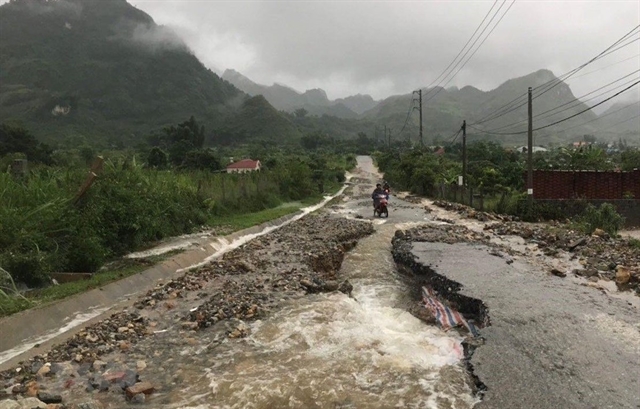 Society
Society

The Ministry of Natural Resources and Environment will continue improving forecasts to give quick warnings of extreme and dangerous weather to try and prevent national disasters.

|
| Flash floods damage a road in the northern mountainous province of Lai Châu earlier this month. — VNA/VNS Photo |
HÀ NỘI — The Ministry of Natural Resources and Environment will continue improving forecasts to give quick warnings of extreme and dangerous weather to try and prevent national disasters.
Speaking about the assessment of hydrometeorological developments in the last six months at a recent press briefing, director of the National Hydrometeorological Forecast Center Mai Văn Khiêm said storms and tropical depressions are forecast to increase from now until September.
Heat waves would continue in the north and central region in August and there is also the possibility of thunderstorms, lightning and tornados over the next month.
A shortage of water sources was predicted from July to September, especially in the downstream of the Thao and Red Rivers.
In order to minimise the risks, Deputy Director of Water Resources Management Department Châu Trần Vĩnh said the department would coordinate with the General Department of Hydrometeorology, localities and related units to closely monitor the use of water and supervise the operations of large reservoirs.
The department would strengthen the forecast and warning of drought and saline intrusion. It would step up the search of underground water sources to supply drought-prone areas.
It would study and propose solutions to enhance the capacity of flood and freshwater storage for the Mekong River Delta, he said.
Deputy Minister of Natural Resources and Environment Lê Minh Ngân said the ministry needed to focus on completing a legal framework on natural resource management to remove problems and complete tasks.
The biosphere reserves in Việt Nam, for example, have shown many shortcomings.
Currently, there are no guidelines and regulations on the management of biosphere reserves and the fund for the operation of these sites.
In the future, the ministry would propose solutions to consolidate the management of biosphere reserves, develop coordination mechanism among stakeholders, develop a strategy for developing reserves, and promote the creation of databases in the national system.
The ministry would focus on the implementation of land use planning and the national marine planning by 2030 and continue to promote administrative reform, focusing on building databases, e-government and a digital transformation infrastructure.
It would also develop environmental monitoring network as a basis for investment orientation and development of economic sectors while ensuring the social and environmental protection, he said. — VNS




